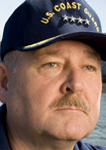DomPrep’s John F. Morton met with Admiral Thad W. Allen, USCG, Commandant, U. S. Coast Guard. The Coast Guard Commandant, probably best known for his role as the federal coordinator for the 2005 Katrina and Rita recovery operations, discusses the Coast Guard’s interagency and intergovernmental linkages that serve and improve national preparedness.
Interagency Lessons Learned from the Katrina Response
How the Coast Guard is “bureaucratically multi-lingual” in matters of port security. The Department of Homeland Security (DHS) focus on improving the department’s interagency unity of effort. How the Katrina flooding required, under the National Response Plan, a shift of tactical control beyond the authority of the Federal Emergency Management Agency (FEMA).
Unity of Effort vs. Unity of Command
The need to clarify, codify, and institutionalize the operational and command relationships among and between the FEMA coordinator, the principal federal official (PFO) in the area of an incident of national significance, and the Joint Task Force (JTF) commander. How the federal response to Katrina divided New Orleans into sectors and assigned federal support resources to local authorities on the basis of deployed capabilities. The Coast Guard’s experience in “brokering solutions” and in partnering. Coast Guard/Navy joint scenarios. Examples of maritime operational threat responses, the role of the captain of the port, and the similarity to oil-spill responses. How DHS force packaging concepts are being developed.
Deepwater C4ISR and Homeland Security
New sensor packages for commonality, interoperability, and networking. Converging the Common Operating Picture, command centers, Rescue 21, and the Maritime Domain Awareness (MDA) plan. DHS joint-requirements successes: the joint handgun acquisition; merged requirements for Customs and Border Protection (CBP) and the Coast Guard; and radiation portal monitors.
Coast Guard Intel Linkage
How intel career paths are “exploding” within the Coast Guard. The linchpin relationship, and collocation of USCG intel with naval intelligence. Interaction with the FBI in maritime-threat responses – e.g., Coast Guard boarding teams supported by FBI hostage rescue teams (HRTs).
Personnel Security and Credentialing
Restructuring the merchant mariner licensing program and vetting processes via the National Maritime Center. The Transportation Workerentification Credential (TWIC), with enrollment now beginning in late December. The prototyping of wireless technology for Coast Guard boarding teams to give them access to existing databases and information sources – e.g., the US-VISIT program.
Seahawk and Other C2 Test-Beds
The four main port security command-and-control “business models” (Charleston, San Diego, Hampton Roads, and Miami), and how they align with local environments. The intent to use these models to arrive at a common concept of operations for Command Center 2010.
Further Discussion of Interagency Linkages
How the Coast Guard is using Coast Guard Reserves and the Coast Guard Auxiliary to support the homeland-security mission. Why FEMA should remain in DHS (to facilitate force packaging with the Coast Guard, for example). The Coast Guard’s role in border security, particularly in the Southwest area of CONUS. The Coast Guard’s role as the national first-responder agency.

Thad W. Allen
Thad Allen, executive vice president at Booz Allen Hamilton, is a leader in the firm’s Departments of Justice and Homeland Security business in the civil market. He leads the development of thought leadership and client engagement regarding the future direction of law enforcement and homeland security. His expertise includes bringing together government and nongovernment entities to address major challenges in a “whole government” approach designed to achieve a unity of effort. In 2010, following the Deepwater Horizon oil spill in the Gulf of Mexico, President Barack Obama selected him as the national incident commander for the unified response. He completed his distinguished career in the U.S. Coast Guard as its 23rd commandant. Before his assignment as commandant, he served as Coast Guard chief of staff. During his tenure in that position, in 2005, he was designated principal federal official for the U.S. government’s response and recovery operations in the aftermath of Hurricanes Katrina and Rita throughout the Gulf Coast region.
- Thad W. Allenhttps://www.domesticpreparedness.com/author/thad-w-allen
- Thad W. Allenhttps://www.domesticpreparedness.com/author/thad-w-allen








